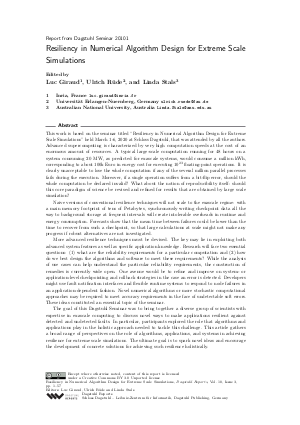Resiliency in Numerical Algorithm Design for Extreme Scale Simulations (Dagstuhl Seminar 20101)
Authors Luc Giraud, Ulrich Rüde, Linda Stals and all authors of the abstracts in this report
-
Part of:
Issue:
Dagstuhl Reports, Volume 10, Issue 3
Part of: Volume: Dagstuhl Reports, Volume 10
Part of: Journal: Dagstuhl Reports (DagRep) - License:
 Creative Commons Attribution 3.0 Unported license
Creative Commons Attribution 3.0 Unported license
- Publication Date: 2020-12-21
File

PDF
DagRep.10.3.1.pdf
- Filesize: 4.53 MB
- 57 pages
Document Identifiers
Subject Classification
ACM Subject Classification
- Theory of computation → Massively parallel algorithms
- Networks → Error detection and error correction
- Computing methodologies → Parallel programming languages
- Computer systems organization → Dependable and fault-tolerant systems and networks
Keywords
- Numerical algorithms
- Parallel computer architecture
- Fault tolerance
- Resilience
Metrics
- Access Statistics
-
Total Accesses (updated on a weekly basis)
0PDF Downloads0Metadata Views
Abstract
This work is based on the seminar titled "Resiliency in Numerical Algorithm Design for Extreme Scale Simulations" held March 1-6, 2020 at Schloss Dagstuhl, that was attended by all the authors. Advanced supercomputing is characterized by very high computation speeds at the cost of an enormous amount of resources. A typical large-scale computation running for 48 hours on a system consuming 20 MW, as predicted for exascale systems, would consume a million kWh, corresponding to about 100k Euro in energy cost for executing 10^{23} floating-point operations. It is clearly unacceptable to lose the whole computation if any of the several million parallel processes fails during the execution. Moreover, if a single operation suffers from a bit-flip error, should the whole computation be declared invalid? What about the notion of reproducibility itself: should this core paradigm of science be revised and refined for results that are obtained by large scale simulation? Naive versions of conventional resilience techniques will not scale to the exascale regime: with a main memory footprint of tens of Petabytes, synchronously writing checkpoint data all the way to background storage at frequent intervals will create intolerable overheads in runtime and energy consumption. Forecasts show that the mean time between failures could be lower than the time to recover from such a checkpoint, so that large calculations at scale might not make any progress if robust alternatives are not investigated. More advanced resilience techniques must be devised. The key may lie in exploiting both advanced system features as well as specific application knowledge. Research will face two essential questions: (1) what are the reliability requirements for a particular computation and (2) how do we best design the algorithms and software to meet these requirements? While the analysis of use cases can help understand the particular reliability requirements, the construction of remedies is currently wide open. One avenue would be to refine and improve on system- or application-level checkpointing and rollback strategies in the case an error is detected. Developers might use fault notification interfaces and flexible runtime systems to respond to node failures in an application-dependent fashion. Novel numerical algorithms or more stochastic computational approaches may be required to meet accuracy requirements in the face of undetectable soft errors. These ideas constituted an essential topic of the seminar. The goal of this Dagstuhl Seminar was to bring together a diverse group of scientists with expertise in exascale computing to discuss novel ways to make applications resilient against detected and undetected faults. In particular, participants explored the role that algorithms and applications play in the holistic approach needed to tackle this challenge. This article gathers a broad range of perspectives on the role of algorithms, applications, and systems in achieving resilience for extreme scale simulations. The ultimate goal is to spark novel ideas and encourage the development of concrete solutions for achieving such resilience holistically.
Cite As Get BibTex
Luc Giraud, Ulrich Rüde, and Linda Stals. Resiliency in Numerical Algorithm Design for Extreme Scale Simulations (Dagstuhl Seminar 20101). In Dagstuhl Reports, Volume 10, Issue 3, pp. 1-57, Schloss Dagstuhl – Leibniz-Zentrum für Informatik (2020)
https://doi.org/10.4230/DagRep.10.3.1
BibTex
@Article{giraud_et_al:DagRep.10.3.1,
author = {Giraud, Luc and R\"{u}de, Ulrich and Stals, Linda},
title = {{Resiliency in Numerical Algorithm Design for Extreme Scale Simulations (Dagstuhl Seminar 20101)}},
pages = {1--57},
journal = {Dagstuhl Reports},
ISSN = {2192-5283},
year = {2020},
volume = {10},
number = {3},
editor = {Giraud, Luc and R\"{u}de, Ulrich and Stals, Linda},
publisher = {Schloss Dagstuhl -- Leibniz-Zentrum f{\"u}r Informatik},
address = {Dagstuhl, Germany},
URL = {https://drops.dagstuhl.de/entities/document/10.4230/DagRep.10.3.1},
URN = {urn:nbn:de:0030-drops-134290},
doi = {10.4230/DagRep.10.3.1},
annote = {Keywords: Numerical algorithms, Parallel computer architecture, Fault tolerance, Resilience}
}
